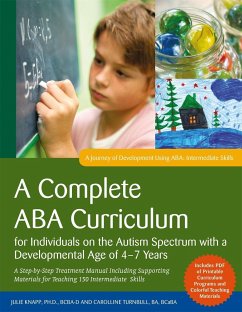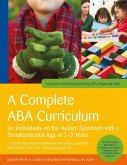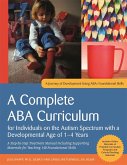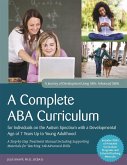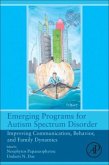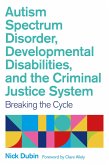Carolline Turnbull, Julie Knapp
A Complete ABA Curriculum for Individuals on the Autism Spectrum with a Developmental Age of 4-7 Years
A Step-by-Step Treatment Manual Including Supporting Materials for Teaching 150 Intermediate Skills
Carolline Turnbull, Julie Knapp
A Complete ABA Curriculum for Individuals on the Autism Spectrum with a Developmental Age of 4-7 Years
A Step-by-Step Treatment Manual Including Supporting Materials for Teaching 150 Intermediate Skills
- Broschiertes Buch
- Merkliste
- Auf die Merkliste
- Bewerten Bewerten
- Teilen
- Produkt teilen
- Produkterinnerung
- Produkterinnerung
A comprehensive, evidence-based curriculum, including supplementary materials, for teaching children with autism spectrum disorders aged approximately 4-7 years key intermediate skills such as comprehension of abstract language, academic skills, advanced social and play skills, and emotional and behavioral regulation skills.
Andere Kunden interessierten sich auch für
![A Complete ABA Curriculum for Individuals on the Autism Spectrum with a Developmental Age of 3-5 Years A Complete ABA Curriculum for Individuals on the Autism Spectrum with a Developmental Age of 3-5 Years]() Julie KnappA Complete ABA Curriculum for Individuals on the Autism Spectrum with a Developmental Age of 3-5 Years97,99 €
Julie KnappA Complete ABA Curriculum for Individuals on the Autism Spectrum with a Developmental Age of 3-5 Years97,99 €![A Complete ABA Curriculum for Individuals on the Autism Spectrum with a Developmental Age of 1-4 Years A Complete ABA Curriculum for Individuals on the Autism Spectrum with a Developmental Age of 1-4 Years]() Julie KnappA Complete ABA Curriculum for Individuals on the Autism Spectrum with a Developmental Age of 1-4 Years97,99 €
Julie KnappA Complete ABA Curriculum for Individuals on the Autism Spectrum with a Developmental Age of 1-4 Years97,99 €![A Complete ABA Curriculum for Individuals on the Autism Spectrum with a Developmental Age of 7 Years Up to Young Adulthood A Complete ABA Curriculum for Individuals on the Autism Spectrum with a Developmental Age of 7 Years Up to Young Adulthood]() Carolline TurnbullA Complete ABA Curriculum for Individuals on the Autism Spectrum with a Developmental Age of 7 Years Up to Young Adulthood97,99 €
Carolline TurnbullA Complete ABA Curriculum for Individuals on the Autism Spectrum with a Developmental Age of 7 Years Up to Young Adulthood97,99 €![Emerging Programs for Autism Spectrum Disorder Emerging Programs for Autism Spectrum Disorder]() Emerging Programs for Autism Spectrum Disorder112,99 €
Emerging Programs for Autism Spectrum Disorder112,99 €![Service Delivery Systems for Individuals with Intellectual and Developmental Disabilities and their Families Across the Lifespan Service Delivery Systems for Individuals with Intellectual and Developmental Disabilities and their Families Across the Lifespan]() Service Delivery Systems for Individuals with Intellectual and Developmental Disabilities and their Families Across the Lifespan127,99 €
Service Delivery Systems for Individuals with Intellectual and Developmental Disabilities and their Families Across the Lifespan127,99 €![Autism Spectrum Disorder, Developmental Disabilities, and the Criminal Justice System Autism Spectrum Disorder, Developmental Disabilities, and the Criminal Justice System]() Nick DubinAutism Spectrum Disorder, Developmental Disabilities, and the Criminal Justice System33,99 €
Nick DubinAutism Spectrum Disorder, Developmental Disabilities, and the Criminal Justice System33,99 €![The Complete Insect The Complete Insect]() The Complete Insect31,99 €
The Complete Insect31,99 €-
-
-
A comprehensive, evidence-based curriculum, including supplementary materials, for teaching children with autism spectrum disorders aged approximately 4-7 years key intermediate skills such as comprehension of abstract language, academic skills, advanced social and play skills, and emotional and behavioral regulation skills.
Produktdetails
- Produktdetails
- Verlag: Jessica Kingsley Publishers
- Seitenzahl: 496
- Erscheinungstermin: 30. September 2017
- Englisch
- Abmessung: 280mm x 217mm x 30mm
- Gewicht: 1212g
- ISBN-13: 9781785929878
- ISBN-10: 1785929879
- Artikelnr.: 49460843
- Herstellerkennzeichnung
- Libri GmbH
- Europaallee 1
- 36244 Bad Hersfeld
- gpsr@libri.de
- Verlag: Jessica Kingsley Publishers
- Seitenzahl: 496
- Erscheinungstermin: 30. September 2017
- Englisch
- Abmessung: 280mm x 217mm x 30mm
- Gewicht: 1212g
- ISBN-13: 9781785929878
- ISBN-10: 1785929879
- Artikelnr.: 49460843
- Herstellerkennzeichnung
- Libri GmbH
- Europaallee 1
- 36244 Bad Hersfeld
- gpsr@libri.de
Carolline Turnbull is a Board Certified Associate Behavior Analyst at KidsLink Neurobehavioral Center in Twinsburg, OH. Carolline is a behavior consultant for home and school based consultation and developed a dance class for children ages 3-6 with varying disabilities and their neurotypical peers. She completed her Bachelor's degree in speech pathology and audiology at Kent State University and her course work for her BCaBA at Florida Institute of Technology. Carolline has worked in the area of behavioral management of children and young adults with developmental disabilities for 15 years.
Acknowledgments. About the Authors. 1. Introduction to ABA Curriculum. 2. Curriculum Guide. 3. ABA Curriculum - Understanding the Task Analyses in this Program. 4. ABA Curriculum - Implementing the Task Analyses in this Program. 5. Teaching Strategies. 6. Data Collection and Data Recording. 7. Graphing. 8. Creating an ABA environment. Curriculum Programs. 9. Imitation Programs. Asymmetrical Poses
Complex Sequence of Motor Imitation (Two-Parts)
Complex Sequence of Motor Imitation (Three-Parts)
Touching Objects in a Sequence
Verbalization of Numbers in a Sequence. 10. Visual Spatial Programs. Arrange Sequence by Order of Story
Arrange Sequence by Steps in a Daily Activity
Arrange Sequence by Social Scene
Building Block Formations to Match Pictures of Block Formations
Geoboards
Screws/Unscrews Jars, Lids, Nuts and Bolts
Strings Beads by Color and Shape. 11. Receptive Language Programs. Abstract Words: Favorite
Abstract Words: Real versus Make Believe
Abstract Words: Yesterday, Today and Tomorrow
Discrimination of Left versus Right
Follows Multiple-Step Directives
Follows Multiple-Step Directives with Negation
Future Tense
Receptive Instructions: Attention and Memory Tasks
Receptive Instructions: Conditional Clauses
Receptive Instructions: 3-Steps
Receptive Labels of Community Helpers based on Actions
Receptive Labels of Complex Categories
Receptive Labels of Complex Emotions
Receptive Labels of Material Composition
Receptive Labels of Objects Based on a Description
Receptive Labels of Places Based on a Description. 12. Expressive Language Programs. Abstract Words: Favorite
Abstract Words: Real versus Make Believe
Abstract Words: Yesterday, Today and Tomorrow
Answers Complex Social Questions
Answers How Questions
Answers Questions about a Conversation
Answers Social Questions about Others
Answers Why Questions
Asks Follow Up Questions to Comments
Asks Questions for Information Gathering: Where are you going?
Asks Questions for Information Gathering: What's that? and Who's that?
Asks Social Questions to Others
Chit-Chat
Commenting to Peer Initiated Conversation
Compliments
Conversations about Non-preferred Topics
Describes Nouns
Describes Sequence of Steps in a Daily Activity
Discrimination of Left versus Right
Empathetic Statements or Questions
Ends Conversations Appropriately
Expressive Labels of Community Helpers Based on Actions
Expressive Labels of Complex Categories
Expressive Labels of Complex Emotions
Expressive Labels of Material Composition
Expressive Labels of Objects Based on a Description
Expressive Labels of Places Based on a Description
Future Tense
General Knowledge and Reasoning
General Knowledge and Reasoning: Absurdities in Pictures
General Knowledge and Reasoning: Unattainable Actions
Gives a Comment to a Compliment
Maintains a Conversation
Offers Assistance
Protesting in a School Setting
Recalls Information
Vocal Volume. 13. Academic Programs. Analogies
Answers Knowledge Questions
Art Skills: Drawing
Art Skills: Multiple Step Art Project
Auditory Comprehension
Calendar
Estimations
Inferences
Math: Counting 1-50
Math: Counting Objects
Math: Counting Out Items from a Larger Set
Math: Counting with a Template
Math: Skip Counting
Part/Whole Relationships II
Pledge of Allegiance
Reading: Matches Phrases and Sentences to Pictures
Reading: Reads Site Words
Reading: Reads Words Beginning with Ch, Th and Sh
Similarities and Differences
Spelling: Spells 2-Letter Sight Words
Spelling: Spells 3-Letter Sight Words
Spelling: Spells 4-Letter Sight Words
Spelling: Spelling with Manipulatives
Temporal Relationships: Before and After
Vocabulary: Expressive
Vocabulary: Receptive
Weather
Writing: Copies Words from the Board
Writing: Makes Lowercase Letters using Manipulatives
Writing: Makes Numbers using Manipulatives
Writing: Makes Uppercase Letters using Manipulatives
Writing: Write Lowercase Letters
Writing: Writes Name
Writing: Writes Numbers 1-10
Writing: Writes Simple Words
Writing: Writes Uppercase Letters. 14. Play/Social Programs. Board and Card Games
Board Games: Candy Land
Board Games: Chutes and Ladders
Board Games: Hungry Hungry Hippos
Board Games: Sorry!
Board Games: Trouble
Card Games: Uno - Modified, Version 1: Using Only Colors
Card Games: Uno - Modified, Version 2: Adding Wild cards and Draw Four Cards
Card Games: Uno - Modified, Version 3: Adding Draw Two and Reverse Cards
Card Games: Uno - Modified, Version 4: Using the Numbers on the Cards
Commenting During Play
Connect Four
Cooperative Play: Board Games and Card Games
Cooperative Play: Childhood Games
Cooperative Play: Pretend Play
Cooperative Play: Sports
Initiates Play with Peers
Pretend Play: Follows a Script - Camping Trip
Pretend Play: Follows a Script - Going to the Beach
Pretend Play: Follows a Script - Grocery Store
Pretend Play: Takes on Both Roles - Cops and Robbers
Pretend Play: Takes on Both Roles - Superhero and Villain
Pretend Play: Takes on Both Roles - Waiter and Customer
Rides a Bicycle
Swimming: Level 2
Swimming: Level 3
Understands Facial Expressions and Nonverbal Language
Videogame: Wii Playground Racing
Watching Television. 15. Behaviours and Emotional Regulation Programs. Accepting No in a School Setting
Big Problem versus Little Problem
Emotions in Self
Expected Behaviors versus Unexpected Behaviors
Safe Behaviors versus Dangerous Behaviors
Social Stories and Power Cards
Thinking of Me versus Thinking of You
Tolerates Unanticipated Changes
Transitions from Preferred to Non-preferred Activities. 16. Adaptive Skills Programs. Bathing: Drying Self
Bathing: Washing Self
Brushing Hair
Brushing Teeth
Buckling and Unbuckling a Seatbelt
Cutting with a Knife
Open and Close Ziplock Bags
Table Manners
Ties Shoes
Using a Napkin
Waiting in the School Environment. References. Index.
Complex Sequence of Motor Imitation (Two-Parts)
Complex Sequence of Motor Imitation (Three-Parts)
Touching Objects in a Sequence
Verbalization of Numbers in a Sequence. 10. Visual Spatial Programs. Arrange Sequence by Order of Story
Arrange Sequence by Steps in a Daily Activity
Arrange Sequence by Social Scene
Building Block Formations to Match Pictures of Block Formations
Geoboards
Screws/Unscrews Jars, Lids, Nuts and Bolts
Strings Beads by Color and Shape. 11. Receptive Language Programs. Abstract Words: Favorite
Abstract Words: Real versus Make Believe
Abstract Words: Yesterday, Today and Tomorrow
Discrimination of Left versus Right
Follows Multiple-Step Directives
Follows Multiple-Step Directives with Negation
Future Tense
Receptive Instructions: Attention and Memory Tasks
Receptive Instructions: Conditional Clauses
Receptive Instructions: 3-Steps
Receptive Labels of Community Helpers based on Actions
Receptive Labels of Complex Categories
Receptive Labels of Complex Emotions
Receptive Labels of Material Composition
Receptive Labels of Objects Based on a Description
Receptive Labels of Places Based on a Description. 12. Expressive Language Programs. Abstract Words: Favorite
Abstract Words: Real versus Make Believe
Abstract Words: Yesterday, Today and Tomorrow
Answers Complex Social Questions
Answers How Questions
Answers Questions about a Conversation
Answers Social Questions about Others
Answers Why Questions
Asks Follow Up Questions to Comments
Asks Questions for Information Gathering: Where are you going?
Asks Questions for Information Gathering: What's that? and Who's that?
Asks Social Questions to Others
Chit-Chat
Commenting to Peer Initiated Conversation
Compliments
Conversations about Non-preferred Topics
Describes Nouns
Describes Sequence of Steps in a Daily Activity
Discrimination of Left versus Right
Empathetic Statements or Questions
Ends Conversations Appropriately
Expressive Labels of Community Helpers Based on Actions
Expressive Labels of Complex Categories
Expressive Labels of Complex Emotions
Expressive Labels of Material Composition
Expressive Labels of Objects Based on a Description
Expressive Labels of Places Based on a Description
Future Tense
General Knowledge and Reasoning
General Knowledge and Reasoning: Absurdities in Pictures
General Knowledge and Reasoning: Unattainable Actions
Gives a Comment to a Compliment
Maintains a Conversation
Offers Assistance
Protesting in a School Setting
Recalls Information
Vocal Volume. 13. Academic Programs. Analogies
Answers Knowledge Questions
Art Skills: Drawing
Art Skills: Multiple Step Art Project
Auditory Comprehension
Calendar
Estimations
Inferences
Math: Counting 1-50
Math: Counting Objects
Math: Counting Out Items from a Larger Set
Math: Counting with a Template
Math: Skip Counting
Part/Whole Relationships II
Pledge of Allegiance
Reading: Matches Phrases and Sentences to Pictures
Reading: Reads Site Words
Reading: Reads Words Beginning with Ch, Th and Sh
Similarities and Differences
Spelling: Spells 2-Letter Sight Words
Spelling: Spells 3-Letter Sight Words
Spelling: Spells 4-Letter Sight Words
Spelling: Spelling with Manipulatives
Temporal Relationships: Before and After
Vocabulary: Expressive
Vocabulary: Receptive
Weather
Writing: Copies Words from the Board
Writing: Makes Lowercase Letters using Manipulatives
Writing: Makes Numbers using Manipulatives
Writing: Makes Uppercase Letters using Manipulatives
Writing: Write Lowercase Letters
Writing: Writes Name
Writing: Writes Numbers 1-10
Writing: Writes Simple Words
Writing: Writes Uppercase Letters. 14. Play/Social Programs. Board and Card Games
Board Games: Candy Land
Board Games: Chutes and Ladders
Board Games: Hungry Hungry Hippos
Board Games: Sorry!
Board Games: Trouble
Card Games: Uno - Modified, Version 1: Using Only Colors
Card Games: Uno - Modified, Version 2: Adding Wild cards and Draw Four Cards
Card Games: Uno - Modified, Version 3: Adding Draw Two and Reverse Cards
Card Games: Uno - Modified, Version 4: Using the Numbers on the Cards
Commenting During Play
Connect Four
Cooperative Play: Board Games and Card Games
Cooperative Play: Childhood Games
Cooperative Play: Pretend Play
Cooperative Play: Sports
Initiates Play with Peers
Pretend Play: Follows a Script - Camping Trip
Pretend Play: Follows a Script - Going to the Beach
Pretend Play: Follows a Script - Grocery Store
Pretend Play: Takes on Both Roles - Cops and Robbers
Pretend Play: Takes on Both Roles - Superhero and Villain
Pretend Play: Takes on Both Roles - Waiter and Customer
Rides a Bicycle
Swimming: Level 2
Swimming: Level 3
Understands Facial Expressions and Nonverbal Language
Videogame: Wii Playground Racing
Watching Television. 15. Behaviours and Emotional Regulation Programs. Accepting No in a School Setting
Big Problem versus Little Problem
Emotions in Self
Expected Behaviors versus Unexpected Behaviors
Safe Behaviors versus Dangerous Behaviors
Social Stories and Power Cards
Thinking of Me versus Thinking of You
Tolerates Unanticipated Changes
Transitions from Preferred to Non-preferred Activities. 16. Adaptive Skills Programs. Bathing: Drying Self
Bathing: Washing Self
Brushing Hair
Brushing Teeth
Buckling and Unbuckling a Seatbelt
Cutting with a Knife
Open and Close Ziplock Bags
Table Manners
Ties Shoes
Using a Napkin
Waiting in the School Environment. References. Index.
Acknowledgments. About the Authors. 1. Introduction to ABA Curriculum. 2. Curriculum Guide. 3. ABA Curriculum - Understanding the Task Analyses in this Program. 4. ABA Curriculum - Implementing the Task Analyses in this Program. 5. Teaching Strategies. 6. Data Collection and Data Recording. 7. Graphing. 8. Creating an ABA environment. Curriculum Programs. 9. Imitation Programs. Asymmetrical Poses
Complex Sequence of Motor Imitation (Two-Parts)
Complex Sequence of Motor Imitation (Three-Parts)
Touching Objects in a Sequence
Verbalization of Numbers in a Sequence. 10. Visual Spatial Programs. Arrange Sequence by Order of Story
Arrange Sequence by Steps in a Daily Activity
Arrange Sequence by Social Scene
Building Block Formations to Match Pictures of Block Formations
Geoboards
Screws/Unscrews Jars, Lids, Nuts and Bolts
Strings Beads by Color and Shape. 11. Receptive Language Programs. Abstract Words: Favorite
Abstract Words: Real versus Make Believe
Abstract Words: Yesterday, Today and Tomorrow
Discrimination of Left versus Right
Follows Multiple-Step Directives
Follows Multiple-Step Directives with Negation
Future Tense
Receptive Instructions: Attention and Memory Tasks
Receptive Instructions: Conditional Clauses
Receptive Instructions: 3-Steps
Receptive Labels of Community Helpers based on Actions
Receptive Labels of Complex Categories
Receptive Labels of Complex Emotions
Receptive Labels of Material Composition
Receptive Labels of Objects Based on a Description
Receptive Labels of Places Based on a Description. 12. Expressive Language Programs. Abstract Words: Favorite
Abstract Words: Real versus Make Believe
Abstract Words: Yesterday, Today and Tomorrow
Answers Complex Social Questions
Answers How Questions
Answers Questions about a Conversation
Answers Social Questions about Others
Answers Why Questions
Asks Follow Up Questions to Comments
Asks Questions for Information Gathering: Where are you going?
Asks Questions for Information Gathering: What's that? and Who's that?
Asks Social Questions to Others
Chit-Chat
Commenting to Peer Initiated Conversation
Compliments
Conversations about Non-preferred Topics
Describes Nouns
Describes Sequence of Steps in a Daily Activity
Discrimination of Left versus Right
Empathetic Statements or Questions
Ends Conversations Appropriately
Expressive Labels of Community Helpers Based on Actions
Expressive Labels of Complex Categories
Expressive Labels of Complex Emotions
Expressive Labels of Material Composition
Expressive Labels of Objects Based on a Description
Expressive Labels of Places Based on a Description
Future Tense
General Knowledge and Reasoning
General Knowledge and Reasoning: Absurdities in Pictures
General Knowledge and Reasoning: Unattainable Actions
Gives a Comment to a Compliment
Maintains a Conversation
Offers Assistance
Protesting in a School Setting
Recalls Information
Vocal Volume. 13. Academic Programs. Analogies
Answers Knowledge Questions
Art Skills: Drawing
Art Skills: Multiple Step Art Project
Auditory Comprehension
Calendar
Estimations
Inferences
Math: Counting 1-50
Math: Counting Objects
Math: Counting Out Items from a Larger Set
Math: Counting with a Template
Math: Skip Counting
Part/Whole Relationships II
Pledge of Allegiance
Reading: Matches Phrases and Sentences to Pictures
Reading: Reads Site Words
Reading: Reads Words Beginning with Ch, Th and Sh
Similarities and Differences
Spelling: Spells 2-Letter Sight Words
Spelling: Spells 3-Letter Sight Words
Spelling: Spells 4-Letter Sight Words
Spelling: Spelling with Manipulatives
Temporal Relationships: Before and After
Vocabulary: Expressive
Vocabulary: Receptive
Weather
Writing: Copies Words from the Board
Writing: Makes Lowercase Letters using Manipulatives
Writing: Makes Numbers using Manipulatives
Writing: Makes Uppercase Letters using Manipulatives
Writing: Write Lowercase Letters
Writing: Writes Name
Writing: Writes Numbers 1-10
Writing: Writes Simple Words
Writing: Writes Uppercase Letters. 14. Play/Social Programs. Board and Card Games
Board Games: Candy Land
Board Games: Chutes and Ladders
Board Games: Hungry Hungry Hippos
Board Games: Sorry!
Board Games: Trouble
Card Games: Uno - Modified, Version 1: Using Only Colors
Card Games: Uno - Modified, Version 2: Adding Wild cards and Draw Four Cards
Card Games: Uno - Modified, Version 3: Adding Draw Two and Reverse Cards
Card Games: Uno - Modified, Version 4: Using the Numbers on the Cards
Commenting During Play
Connect Four
Cooperative Play: Board Games and Card Games
Cooperative Play: Childhood Games
Cooperative Play: Pretend Play
Cooperative Play: Sports
Initiates Play with Peers
Pretend Play: Follows a Script - Camping Trip
Pretend Play: Follows a Script - Going to the Beach
Pretend Play: Follows a Script - Grocery Store
Pretend Play: Takes on Both Roles - Cops and Robbers
Pretend Play: Takes on Both Roles - Superhero and Villain
Pretend Play: Takes on Both Roles - Waiter and Customer
Rides a Bicycle
Swimming: Level 2
Swimming: Level 3
Understands Facial Expressions and Nonverbal Language
Videogame: Wii Playground Racing
Watching Television. 15. Behaviours and Emotional Regulation Programs. Accepting No in a School Setting
Big Problem versus Little Problem
Emotions in Self
Expected Behaviors versus Unexpected Behaviors
Safe Behaviors versus Dangerous Behaviors
Social Stories and Power Cards
Thinking of Me versus Thinking of You
Tolerates Unanticipated Changes
Transitions from Preferred to Non-preferred Activities. 16. Adaptive Skills Programs. Bathing: Drying Self
Bathing: Washing Self
Brushing Hair
Brushing Teeth
Buckling and Unbuckling a Seatbelt
Cutting with a Knife
Open and Close Ziplock Bags
Table Manners
Ties Shoes
Using a Napkin
Waiting in the School Environment. References. Index.
Complex Sequence of Motor Imitation (Two-Parts)
Complex Sequence of Motor Imitation (Three-Parts)
Touching Objects in a Sequence
Verbalization of Numbers in a Sequence. 10. Visual Spatial Programs. Arrange Sequence by Order of Story
Arrange Sequence by Steps in a Daily Activity
Arrange Sequence by Social Scene
Building Block Formations to Match Pictures of Block Formations
Geoboards
Screws/Unscrews Jars, Lids, Nuts and Bolts
Strings Beads by Color and Shape. 11. Receptive Language Programs. Abstract Words: Favorite
Abstract Words: Real versus Make Believe
Abstract Words: Yesterday, Today and Tomorrow
Discrimination of Left versus Right
Follows Multiple-Step Directives
Follows Multiple-Step Directives with Negation
Future Tense
Receptive Instructions: Attention and Memory Tasks
Receptive Instructions: Conditional Clauses
Receptive Instructions: 3-Steps
Receptive Labels of Community Helpers based on Actions
Receptive Labels of Complex Categories
Receptive Labels of Complex Emotions
Receptive Labels of Material Composition
Receptive Labels of Objects Based on a Description
Receptive Labels of Places Based on a Description. 12. Expressive Language Programs. Abstract Words: Favorite
Abstract Words: Real versus Make Believe
Abstract Words: Yesterday, Today and Tomorrow
Answers Complex Social Questions
Answers How Questions
Answers Questions about a Conversation
Answers Social Questions about Others
Answers Why Questions
Asks Follow Up Questions to Comments
Asks Questions for Information Gathering: Where are you going?
Asks Questions for Information Gathering: What's that? and Who's that?
Asks Social Questions to Others
Chit-Chat
Commenting to Peer Initiated Conversation
Compliments
Conversations about Non-preferred Topics
Describes Nouns
Describes Sequence of Steps in a Daily Activity
Discrimination of Left versus Right
Empathetic Statements or Questions
Ends Conversations Appropriately
Expressive Labels of Community Helpers Based on Actions
Expressive Labels of Complex Categories
Expressive Labels of Complex Emotions
Expressive Labels of Material Composition
Expressive Labels of Objects Based on a Description
Expressive Labels of Places Based on a Description
Future Tense
General Knowledge and Reasoning
General Knowledge and Reasoning: Absurdities in Pictures
General Knowledge and Reasoning: Unattainable Actions
Gives a Comment to a Compliment
Maintains a Conversation
Offers Assistance
Protesting in a School Setting
Recalls Information
Vocal Volume. 13. Academic Programs. Analogies
Answers Knowledge Questions
Art Skills: Drawing
Art Skills: Multiple Step Art Project
Auditory Comprehension
Calendar
Estimations
Inferences
Math: Counting 1-50
Math: Counting Objects
Math: Counting Out Items from a Larger Set
Math: Counting with a Template
Math: Skip Counting
Part/Whole Relationships II
Pledge of Allegiance
Reading: Matches Phrases and Sentences to Pictures
Reading: Reads Site Words
Reading: Reads Words Beginning with Ch, Th and Sh
Similarities and Differences
Spelling: Spells 2-Letter Sight Words
Spelling: Spells 3-Letter Sight Words
Spelling: Spells 4-Letter Sight Words
Spelling: Spelling with Manipulatives
Temporal Relationships: Before and After
Vocabulary: Expressive
Vocabulary: Receptive
Weather
Writing: Copies Words from the Board
Writing: Makes Lowercase Letters using Manipulatives
Writing: Makes Numbers using Manipulatives
Writing: Makes Uppercase Letters using Manipulatives
Writing: Write Lowercase Letters
Writing: Writes Name
Writing: Writes Numbers 1-10
Writing: Writes Simple Words
Writing: Writes Uppercase Letters. 14. Play/Social Programs. Board and Card Games
Board Games: Candy Land
Board Games: Chutes and Ladders
Board Games: Hungry Hungry Hippos
Board Games: Sorry!
Board Games: Trouble
Card Games: Uno - Modified, Version 1: Using Only Colors
Card Games: Uno - Modified, Version 2: Adding Wild cards and Draw Four Cards
Card Games: Uno - Modified, Version 3: Adding Draw Two and Reverse Cards
Card Games: Uno - Modified, Version 4: Using the Numbers on the Cards
Commenting During Play
Connect Four
Cooperative Play: Board Games and Card Games
Cooperative Play: Childhood Games
Cooperative Play: Pretend Play
Cooperative Play: Sports
Initiates Play with Peers
Pretend Play: Follows a Script - Camping Trip
Pretend Play: Follows a Script - Going to the Beach
Pretend Play: Follows a Script - Grocery Store
Pretend Play: Takes on Both Roles - Cops and Robbers
Pretend Play: Takes on Both Roles - Superhero and Villain
Pretend Play: Takes on Both Roles - Waiter and Customer
Rides a Bicycle
Swimming: Level 2
Swimming: Level 3
Understands Facial Expressions and Nonverbal Language
Videogame: Wii Playground Racing
Watching Television. 15. Behaviours and Emotional Regulation Programs. Accepting No in a School Setting
Big Problem versus Little Problem
Emotions in Self
Expected Behaviors versus Unexpected Behaviors
Safe Behaviors versus Dangerous Behaviors
Social Stories and Power Cards
Thinking of Me versus Thinking of You
Tolerates Unanticipated Changes
Transitions from Preferred to Non-preferred Activities. 16. Adaptive Skills Programs. Bathing: Drying Self
Bathing: Washing Self
Brushing Hair
Brushing Teeth
Buckling and Unbuckling a Seatbelt
Cutting with a Knife
Open and Close Ziplock Bags
Table Manners
Ties Shoes
Using a Napkin
Waiting in the School Environment. References. Index.

